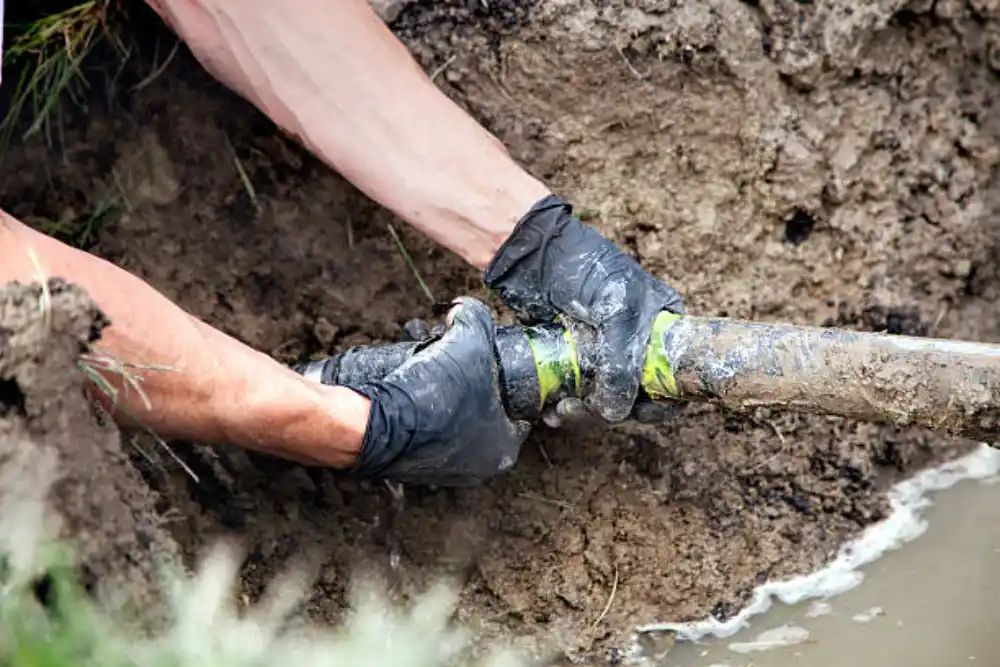Winter brings a list of problems, like slippery roads, frozen vehicle locks, and higher heating expenditures. However, many homes ignore frozen sewage pipes. Can sewer lines freeze? The simple answer is yes, and it is not something you should disregard. When your sewer line freezes, sewage can back up into your house, causing nasty odors and very costly repairs.
Let’s look at what causes this problem, how to cure it, and what you can do to keep it from happening again.
Can Sewer Lines Freeze?
You bet they can. Can sewer lines freeze even if they’re underground? Absolutely. When the temperature goes low enough, and the pipes are either too shallow or inadequately insulated, water and waste might freeze solid.
What Temperature Do Sewer Lines Freeze at?
Water freezes at 32°F (0°C). However, sewage pipes may not freeze at that specific temperature. A combination of cold temperatures, poor water flow, and exposure might heighten the danger. Prolonged spells below freezing can be problematic, particularly in areas with harsh winters.
Factors That Influence Sewer Lines Freezing
Pipe Depth and Exposure
Pipes buried deeper—usually below the frost line—are less prone to freeze. Shallow or exposed pipelines represent an increased risk.
Ground Insulation and Soil Type
Loose, sandy soil insulates poorly, but thick, clay-rich soil provides superior insulation. Surprisingly, snow may function as an insulator.
Causes of Frozen Sewer Lines
Poor Insulation or Shallow Installation
When sewer lines are not placed deep enough or properly insulated, freezing is likely. A sudden dip in temperature might take you off guard.
Prolonged Cold Weather and Low Usage
If you’re on vacation or don’t use much water, pipes remain idle. This stagnation allows the temperature to drop below freezing.
Leaks or Cracks that Allow Moisture in
Small leaks might bring moisture into the earth’s surrounding pipes. That water may freeze, harming the line.
Blockages that Trap Water in Pipes
Even a tiny obstruction can confine water in one location. When the stored water freezes, it might grow and completely block the pipe.
Risks and Consequences of Frozen Sewer Lines
Sewage Backups Into the Home
This is the most imminent and nasty threat. You’ll know if it happens, and you’ll want it addressed right away.
Cracked or Burst Sewer Pipes
Frozen water expands. If your pipes cannot withstand the strain, they may fracture or even break.
Loss of Plumbing Functionality
Suddenly, your drains cease functioning. The toilet will not flush. It’s as if your whole plumbing system is on strike.
Foul Odors and Unhygienic Conditions
Frozen pipes can trap sewage gas and introduce smells into your house. Nobody wants their home to smell like a sewer.
Expensive Emergency Repairs
Frozen sewage pipes are more than simply a nuisance. They can cost significant dollars to fix, particularly if they burst or cause damage.
Structural Damage to Property
Backed-up sewage can flood your basement or crawlspace, causing damage to flooring, drywall, and other materials.
Potential Health Hazards
Standing sewage provides a breeding habitat for bacteria. It’s not only disgusting; it’s hazardous.
How Do I Know if My Sewer Line is Frozen?
Common Signs and Symptoms
Foul Odors
If your home begins to smell like rotten eggs, it may be due to a clogged or frozen sewer line.
Slow Drains or Backups
Is water taking forever to drain? Toilet bubbling or overflowing? Something is certainly wrong.
Gurgling Sounds
These unusual noises generally indicate that water or ice has trapped air inside the pipe.
Inspection Tips for Frozen Sewer Lines
Check Multiple Drains for Backup
If many drains are sluggish or clogged, the problem is most likely with the main sewage line.
Listen for Unusual Gurgling Sounds
Drain or toilet sounds frequently indicate trapped air or a buildup of water pressure.
Look for Frost or Ice on Exposed Pipes
Inspect crawlspaces and basements for apparent frost on sewer pipe sections.
Check for Strong Sewage Odors
A frozen line frequently retains gasses, which eventually escape into your home via drains.
Use a Pipe or Infrared Thermometer
Check the temps at accessible sites. If the pipe is below freezing, it may be frozen.
How to Unfreeze a Sewer Line
Hot Water Flushing
Pouring hot water down the drain will occasionally dissolve a minor clog.
Using a Heat Tape or Electric Pipe Heating Cable
These devices wrap around the pipe and apply mild, regulated heat to safely defrost it.
Sewer Jetting (If Applicable)
Professional plumbers can utilize high-pressure water jets to unblock clogs and melt ice within pipes.
Wondering how to unfreeze a sewer line safely? This is one job where a pro can save you a big headache.

How to Keep Your Sewer Line From Freezing
Regular Maintenance
Routine inspections can aid pinpoint issues before they become serious. It’s simpler to prevent a freeze than to fix one.
Keep Water Flowing During Cold Spells
When the weather gets cold, run a trickle of warm water overnight. Moving water does not freeze as easily.
Adjust Landscaping to Help Insulate Pipes
Planting bushes or putting mulch over sewage pipes can help keep the ground temperature up.
Knowing how to keep the sewer line from freezing can help you avoid an unpleasant winter surprise.
How to Insulate a Sewer Pipe
Exterior Pipe Insulation Options
Foam Pipe Sleeves
These wrap-around exterior pipes and help keep the cold away.
Heat Cables
They are particularly useful in colder climates since they actively warm the pipe with electricity.
Indoor Pipe Insulation Options
Foam Pipe Insulation Sleeves
Simple to install and effective for basement or crawlspace pipes.
Fiberglass Pipe Wrap with Vapor Barrier
An excellent solution for longer or more difficult-to-reach pipe portions.
Foam and Foil Pipe Wrap (Self-Adhesive)
This alternative combines insulation with ease of installation and is ideal for confined spaces.
Problems With Frozen Sewer Lines? We Can Help!
Frozen pipes are more than simply an annoyance; they’re a ticking time bomb beneath your house. Can sewer lines freeze? Yes, and the effects are not desirable. Knowing how to keep the sewer line from freezing and understanding how to unfreeze a sewer line when necessary will save you time, money, and frustration.
At Trades Works NW, we’ve seen it all, from tiny clogs to complete freeze-ups. We serve Snohomish and King counties and offer experienced sewer inspection, repair, and winterization services to keep your house operating smoothly. Don’t wait for calamity to strike—contact us now, and we’ll get your pipes ready for winter!
